Pulp | ||
| Allmusic Biography : Most bands hit the big time immediately and fade away, or they build a dedicated following and slowly climb their way to the top. Pulp didnt follow either route. For the first 12 years of their existence, Pulp languished in near total obscurity, releasing a handful of albums and singles in the 80s to barely any attention. At the turn of the decade, the group began to gain an audience, sparking a remarkable turn of events that made the band one of the most popular British groups of the 90s. By the time Pulp became famous, the band had gone through numerous different incarnations and changes in style, covering nearly every indie rock touchstone from post-punk to dance. Pulps signature sound is a fusion of David Bowie and Roxy Musics glam rock, disco, new wave, acid house, Europop, and British indie rock. The groups cheap synthesizers and sweeping melodies reflect the lyrical obsessions of lead vocalist Jarvis Cocker, who alternates between sex and sharp, funny portraits of working class misfits. Out of second-hand pop, Pulp fashioned a distinctive, stylish sound that made camp into something grand and glamorous that retained a palpable sense of gritty reality. Jarvis Cocker formed Pulp in 1978, when he was 15 years old. Originally called Arabicus Pulp, the first lineup consisted of schoolmates of Cocker. After a year, the bands name was truncated to Pulp. While they were in school, Pulp performed a handful of gigs. The band recorded a demo sometime in 1980-1981, giving the tape to John Peel at one of his traveling shows. Peel liked the tape and invited the band to appear on his show. Pulp had their first Peel Session in November 1981. Instead of leading to record deals and pop stardom, Pulps appearance on Peel led nowhere. Discouraged by the bands lack of success, every member but Cocker left the band in 1982 to go to university. The following year, Cocker assembled a new lineup which featured eight members, including keyboardist Simon Hinkler, who would later join the Mission. In this incarnation, Pulp had distinct folk overtones, as well as new wave underpinnings. The group landed their first record contract, releasing their debut album, It, in 1984. It didnt make much of an impact and the band fell apart again. After the second incarnation of Pulp disintegrated, Jarvis Cocker formed another version of the band, with guitarist/violinist Russell Senior, who became Cockers first full-fledged collaborator. Cocker and Senior added drummer Magnus Doyle and bassist Peter Mansell to the group, as well as Tim Allcard, who did nothing but read poetry. Musically, Pulp backed away from the folky inclinations of It, adding keyboardist Candida Doyle in 1985, which led to a darker sound; shortly after her arrival, Allcard left the group. In 1985, Pulp released a series of singles on Fire Records. Just as their fortunes were looking up, Cocker became injured severely. As he was trying to impress a girl, he fell 30 feet out of a window, injuring his pelvis, foot, and wrist. For two months, he was confined to a wheelchair, but he performed concerts anyway. Released in 1986, Pulps second album, Freaks, was a dense, dark affair. Following its release, the band split during the filming of the video for "They Suffocate at Night." All of the members, except Cocker and Senior, left the group. For a year, the band was dormant, but Candida Doyle returned in 1987, with drummer Nick Banks and bassist Steven Havenhand joining shortly afterward. Havenhand was soon replaced by Anthony Genn, who was soon replaced by Steve Mackey. Although the group had a stable lineup, they werent gaining much of a following. In 1988, Cocker moved to London with Mackey and began studying filmmaking at St. Martins College. While he was studying, Pulp was offered the chance to record another album. The resulting album, Separations, was recorded in 1989 and reflected Cockers newfound obsession with acid house but it also boasted some full-fledged pop songs. Separations was released nearly three years after it was completed. Cocker was prepared to stake out a career in film when a single from the album, "My Legendary Girlfriend," was released. NME named the song Single of the Week in 1991 and Pulps career suddenly took off. In early 1992, Pulp left Fire Records for Gift, and began releasing a series of singles that consolidated the success of "My Legendary Girlfriend." In particular, "Babies" earned the band a great deal of attention. "Babies" led to a contract with Island Records, their first major-label deal. Island released Pulpintro, a compilation of the Gift singles, as the band recorded its major-label debut, His n Hers. Upon its spring 1994 release, His n Hers earned positive reviews and became an unexpected success, reaching the British Top Ten; it was also nominated for the 1994 Mercury Award. For the rest of 1994 and the early part of 1995, Jarvis Cocker suddenly became omnipresent on British television. These suave, humorous television appearances became legendary, making Cocker somewhat of a national hero, as well as a sex symbol. No matter how popular Jarvis Cocker had become, the band didnt break into the big time until they released "Common People." The single became a massive hit upon its May 1995 release, debuting at number two on the U.K. charts. In July, Pulp accepted a last-minute headlining slot at Glastonbury Festival when the Stone Roses had to cancel. Pulps set was rapturously received, launching the band into superstar status in England and conveniently setting the stage for their forthcoming album, Different Class. During the recording of the album, guitarist Mark Webber -- the president of Pulps fan club -- became a full-time member of the group. The first record to feature Webber was the double A-sided single, "Mis-Shapes" and "Sorted for Es & Wizz," which was released in August, two months before Different Class. The single became a number two hit, despite a major tabloid controversy over the lyrics to "Sorted." Different Class arrived in late October to rave reviews throughout the British press. The album entered the charts at number one, going gold within its first week and platinum within the second. At the end of the year, the album topped many best-of-the-year lists. In February of 1996, Different Class was released in the United States to positive reviews. The massive fame and attention that Different Class brought Pulp influenced the direction of their follow-up, 1998s world-weary, paranoid This Is Hardcore. The albums troubled sound and somewhat mixed reception led some to speculate whether or not the group would continue; the bands members took some time to pursue side projects such as DJ-ing at various nightclubs and remixing tracks for artists like Black Box Recorder and Death in Vegas. Meanwhile, they continued to play live, performing at various festivals, including the Meltdown festival curated by Scott Walker. Walker proved such an inspiration for the group that Pulp hired him on as the producer of their new material after recording with Chris Thomas went unsatisfactorily. The resulting album, We Love Life -- its name inspired by the September 11 terrorist attacks -- was released in the fall of 2001 in the UK and in the spring of 2002 in the US to critical acclaim. In 2006, Cocker released a solo album entitled Jarvis. | ||
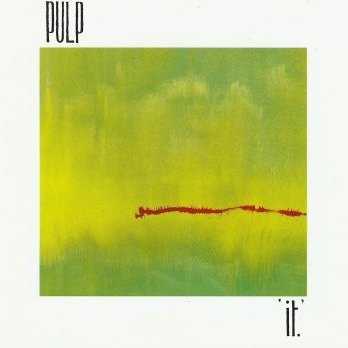 | Album: 1 of 18 Title: It Released: 1983-04-18 Tracks: 10 Duration: 37:48 Scroll: Up Down Top Bottom 25% 50% 75% Spotify Allmusic Wikipedia AlbumCover | 1 My Lighthouse (album version) (03:30) 2 Wishful Thinking (04:16) 3 Joking Aside (04:20) 4 Boats and Trains (01:34) 5 Blue Girls (05:58) 6 Love Love (03:09) 7 In Many Ways (02:46) 8 Looking for Life (05:27) 9 Everybody’s Problem (03:14) 10 There Was… (03:30) |
| It : Allmusic album Review : It is a gentle, mainly acoustic album that gives very few signs to the musical directions Pulp would later pursue. Lacking any hint of synthesizers or dance music, the album occasionally touches on the majestic, theatrical ballads of Scott Walker, as well as the stark, folky song poems of Leonard Cohen. However, at this stage, Jarvis Cocker is hardly the lyrical equivalent of either songwriter, and his singing is endearingly awkward -- occasionally he misses notes, and he misses the tune every once in a while. Nevertheless, there are tunes throughout the album, whether its the light opening single "My Lighthouse" or the silly, music hall stomp of "Love Love." It isnt a great album, but it has an effortless, amateurish charm that makes up for the unformed songs and the bands rudimentary musical skills. | ||
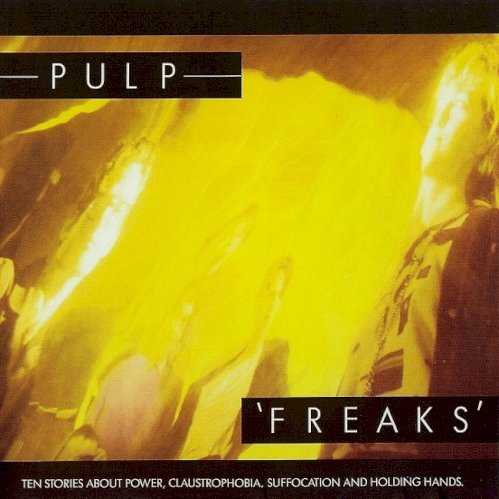 | Album: 2 of 18 Title: Freaks Released: 1987-05 Tracks: 10 Duration: 44:10 Scroll: Up Down Top Bottom 25% 50% 75% Spotify Allmusic AlbumCover | 1 Fairground (05:07) 2 I Want You (04:42) 3 Being Followed Home (06:03) 4 Master of the Universe (03:22) 5 Life Must Be So Wonderful (03:59) 6 There’s No Emotion (04:28) 7 Anorexic Beauty (02:59) 8 The Never‐Ending Story (03:01) 9 Don’t You Know (04:09) 10 They Suffocate at Night (06:18) |
| Freaks : Allmusic album Review : Freaks is so different than It that it nearly sounds like a different band. Granted, that is largely due to the fact that Pulp was a different band, apart from lead vocalist Jarvis Cocker. After the unsuccessful showing of It, the band broke up, leaving Cocker to assemble a new lineup. The most significant new member was Russell Senior, who brought a fascination with art, noise, and neo-gothic overtones to the band. But that change in sound isnt the only reason why Freaks is the darkest record Pulp ever made, or ever will make. Cockers lyrics are neurotically gloomy and paranoid, obsessed with failures and outcasts. While this would become a signature theme for Pulps songs, Cockers outlook on Freaks is oppressively bleak -- he finds no future for the mis-shapes and misfits in his songs. Not only are the songs hopeless, so is the production. The very sound of Freaks is muddy and impenetrable, making it difficult to find the occasional rewarding moment on the album, such as "Master of the Universe," "They Suffocate at Night," or Seniors "Anorexic Beauty." | ||
 | Album: 3 of 18 Title: Separations Released: 1992-07 Tracks: 9 Duration: 48:37 Scroll: Up Down Top Bottom 25% 50% 75% Spotify Allmusic AlbumCover | 1 Love Is Blind (05:45) 2 Don’t You Want Me Anymore? (03:52) 3 She’s Dead (05:09) 4 Separations (04:45) 5 Down by the River (03:39) 6 Countdown (05:07) 7 My Legendary Girlfriend (06:49) 8 Death II (05:36) 9 This House Is Condemned (07:52) |
| Separations : Allmusic album Review : Separations is the birth of the modern Pulp. Not only does the record feature the lineup that would eventually break through into the mainstream, it is the first album to contain the fusion of pop, dance, and rock that would take them to the top of the charts in the mid-90s. More than anything, the influence of acid house and raves weighs heavily on Separations, as the band stretches out into the disco groove of "Countdown" and the long jam "This House Is Condemned." But what is especially noticeable about Separations is how Pulp is finally starting to write some fully realized songs. "My Legendary Girlfriend," the song that earned the band its first Single of the Week in NME, is the leader of the pack with a brilliant, sly lyric and vocal from Jarvis Cocker, and an appropriately melodic and slightly dirty instrumental backdrop from the band. "Countdown," with its insistent beat, is nearly as good, as is the loping opener, "Love Is Blind." Pulp isnt able to keep the pace throughout the album -- there are several weak spots, particularly the awkward stab at house, "This House Is Condemned" -- but Separations is the first album that illustrates the bands potential and exactly what it could accomplish. | ||
 | Album: 4 of 18 Title: Intro: The Gift Recordings Released: 1993-10-11 Tracks: 9 Duration: 40:15 Scroll: Up Down Top Bottom 25% 50% 75% Spotify Wikipedia Allmusic AlbumCover | 1 Space (05:12) 2 O.U. (12″ mix) (03:44) 3 Babies (04:05) 4 Styloroc (Nites of Suburbia) (03:10) 5 Razzmatazz (03:40) 6 Sheffield: Sex City (08:32) 7 Stacks (02:42) 8 Inside Susan (05:35) 9 59 Lyndhurst Grove (03:32) |
| Intro: The Gift Recordings : Allmusic album Review : All of the singles Pulp recorded for Gift Records, including both the A- and B-sides, are collected on Pulpintro -- The Gift Recordings. From the opening track, "Space," its clear that Pulps confidence and talents have grown considerably, even from the relatively accomplished Separations. Now, the band has created a signature sound that relies heavily on cheap, synthesized sounds as well as tight pop melodies and a theatrical attack that approximates the art rock of Roxy Music and David Bowie. However, Pulp is too concerned with earthly pleasures to really recall Roxy or Bowie. Furthermore, the bands knack for creating terrific pop singles prevents them from being too pretentious, as the singles "O.U.," "Razzamatazz," and, particularly, "Babies" illustrate. And even though its just a collection of singles, Pulpintro holds together as well as Separations, if not better. | ||
 | Album: 5 of 18 Title: His ’n’ Hers Released: 1994-04-18 Tracks: 11 Duration: 50:44 Scroll: Up Down Top Bottom 25% 50% 75% Spotify Wikipedia Allmusic AlbumCover | 1 Joyriders (03:25) 2 Lipgloss (03:35) 3 Acrylic Afternoons (04:09) 4 Have You Seen Her Lately? (04:11) 5 Babies (04:04) 6 She’s a Lady (05:49) 7 Happy Endings (04:57) 8 Do You Remember the First Time? (04:22) 9 Pink Glove (04:48) 10 Someone Like the Moon (04:18) 11 David’s Last Summer (07:01) |
| His ’n’ Hers : Allmusic album Review : Pulp had been kicking around since 1981, but for all intents and purposes, their 1994 major-label debut, His n Hers is their de facto debut: the album that established their musical and lyrical obsessions and, in turn, the album where the world at large became acquainted with their glassy, tightly wound synth pop and lead singer Jarvis Cockers impeccably barbed wit. This was a sound that was carefully thought out, pieced together from old glam and post-punk records, assembled in so it had the immediacy (and hooks) of pop balanced by an artful obsession with moody, dark textures. It was a sound that perfectly fit the subject at hand: it was filled with contradictions -- it was sensual yet intellectual, cheap yet sophisticated, retro yet modern -- with each seeming paradox giving the music weight instead of weighing it down. Given Pulps predilection for crawling mood pieces -- such effective set pieces as the tense "Acrylic Afternoons," or the closing "Davids Last Summer" -- and their studied detachment, it might easy to over-intellectualize the band, particularly in these early days before they reached stardom, but for all of the chilliness of the old analog keyboards and the conscious geek stance of Cocker, this isnt music that aims for the head: its target is the gut and groin, and His n Hers has an immediacy thats apparent as soon as "Joyriders" kicks the album into gear with its crashing guitars. It establishes Pulp not just as a pop band that will rock; it establishes an air of menace that hangs over this album like a talisman. As joyous as certain elements of the music are -- and there isnt just joy but transcendence here, on the fuzz guitars that power the chorus of "Lipgloss," or the dramatic release at the climax of "Babies" -- this isnt light, fizzy music, no matter how the album glistens on its waves of cold synths and echoed guitars, no matter how much sex drives the music here. Cocker doesnt tell tales of conquests: he tells tales of sexual obsession and betrayal, where the seemingly nostalgic question "Do You Remember the First Time?" is answered with the reply, "I cant remember a worst time." On earlier Pulp albums he explored similar stories of alienation, but on His n Hers everything clicks: his lyrics are scalpel sharp, whether hes essaying pathos, passion, or wit, and his band -- driven by the rock-solid drummer Nick Banks and bassist Steve Mackey, along with the arty stylings of keyboardist Candida Doyle and violinist/guitarist Russell Senior -- gives this muscle and blood beneath its stylish exterior. The years etching out Joy Division-inspired goth twaddle in the mid-80s pay off on the tense, dramatic epics that punctuate the glammy pop of the singles "Lipgloss," "Babies," and "Do You Remember the First Time?" And those years of struggle pay off in other ways too, particularly in Cockers carefully rendered observations of life on the fringes of Sheffield, where desperation, sex, and crime are always just a kiss away, and Pulp vividly evokes this world with a startling lack of romanticism but an appropriate amount of drama and a surplus of flair. Its that sense of style coupled with their gut-level immediacy that gives His n Hers its lasting power: this was Pulps shot at the big time and they followed through with a record that so perfectly captured what they were and what they wanted to be, it retains its immediacy years later. | ||
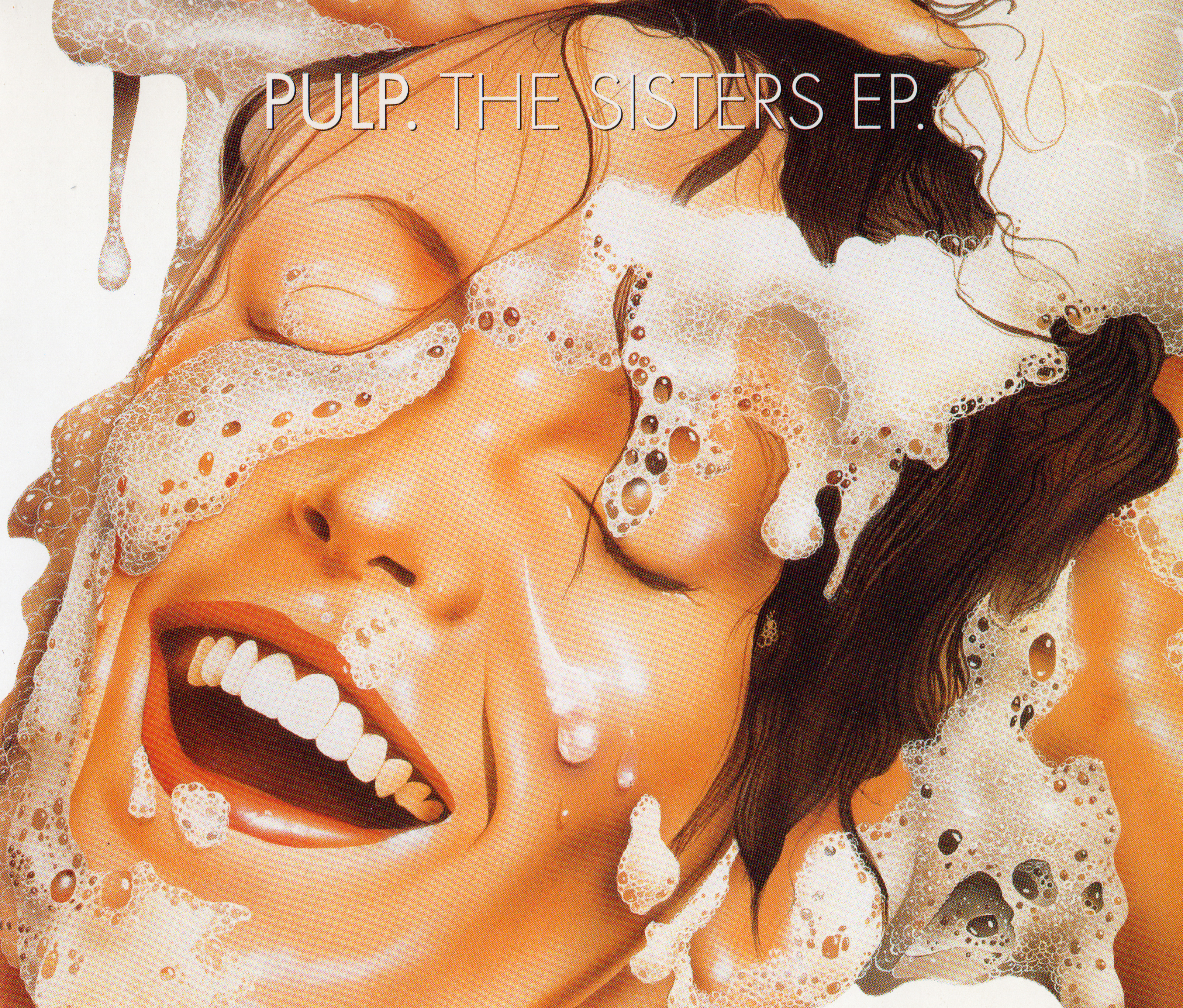 | Album: 6 of 18 Title: The Sisters EP Released: 1994-05-23 Tracks: 4 Duration: 19:20 Scroll: Up Down Top Bottom 25% 50% 75% Wikipedia AlbumCover | 1 Babies (04:04) 2 Your Sister’s Clothes (04:38) 3 Seconds (04:19) 4 His ’n’ Hers (06:19) |
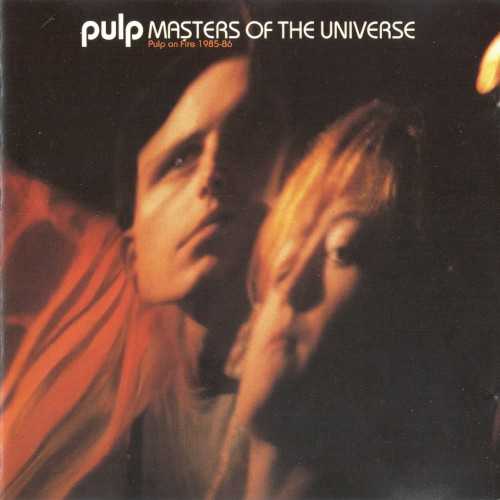 | Album: 7 of 18 Title: Masters of the Universe: Pulp on Fire 1985–86 Released: 1994-06-13 Tracks: 13 Duration: 59:33 Scroll: Up Down Top Bottom 25% 50% 75% Spotify AlbumCover | 1 Little Girl (With Blue Eyes) (03:27) 2 Simultaneous (04:09) 3 Blue Glow (03:04) 4 The Will to Power (03:25) 5 Dogs Are Everywhere (04:53) 6 The Mark of the Devil (04:34) 7 97 Lovers (04:28) 8 Aborigine (04:53) 9 Goodnight (05:08) 10 They Suffocate at Night (06:18) 11 Tunnel (08:13) 12 Master of the Universe (sanitised version) (03:23) 13 Manon (03:33) |
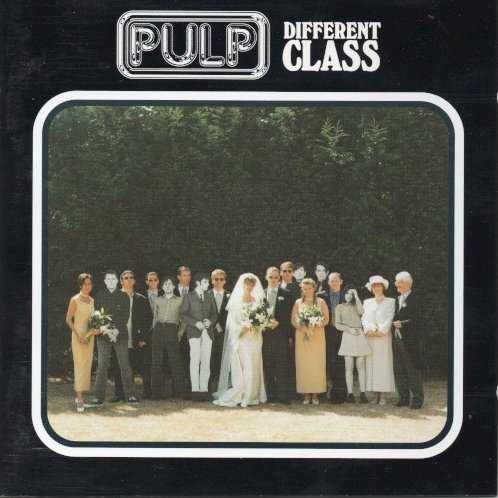 | Album: 8 of 18 Title: Different Class Released: 1995-10-30 Tracks: 12 Duration: 51:58 Scroll: Up Down Top Bottom 25% 50% 75% Spotify Wikipedia Allmusic AlbumCover | 1 Mis‐Shapes (03:46) 2 Pencil Skirt (03:11) 3 Common People (05:51) 4 I Spy (05:55) 5 Disco 2000 (04:33) 6 Live Bed Show (03:29) 7 Something Changed (03:18) 8 Sorted for E’s & Wizz (03:42) 9 F.E.E.L.I.N.G.C.A.L.L.E.D.L.O.V.E (06:01) 10 Underwear (04:06) 11 Monday Morning (04:18) 12 Bar Italia (03:43) |
| Different Class : Allmusic album Review : After years of obscurity, Pulp shot to stardom in Britain with 1994s His n Hers. By the time Different Class was released at the end of October 1995, the band, particularly lead singer Jarvis Cocker, were genuine British superstars, with two number two singles and a triumphant last-minute performance at Glastonbury under their belts, as well as one tabloid scandal. On the heels of such excitement, anticipation for Different Class ran high, and not only does it deliver, it blows away all their previous albums, including the fine His n Hers. Pulp dont stray from their signature formula at all -- its still grandly theatrical, synth-spiked pop with new wave and disco flourishes, but they have mastered it here. Not only are the melodies and hooks significantly catchier and more immediate, the music explores more territory. From the faux-show tune romp of the anthemic opener "Mis-Shapes" and the glitzy, gaudy stomp of "Disco 2000" (complete with a nicked riff from Laura Branigans "Gloria") to the aching ballad "Underwear" and the startling sexual menace of "I Spy," Pulp construct a diverse, appealing album around the same basic sound. Similarly, Jarvis Cockers lyrics take two themes, sex and social class, and explore a number of different avenues in bitingly clever ways. As well as perfectly capturing the behavior of his characters, Cocker grasps the nuances of language, creating a dense portrait of suburban and working-class life. All of his sex songs are compassionate, while the subtle satire of "Sorted for Es & Wizz" is affectionate, but the best moment on the album is the hit single "Common People," about a rich girl who gets off by slumming with the lower class. Coming from Cocker, who made secondhand clothes and music glamorous, the song is undeniably affecting and exciting, much like Different Class itself. | ||
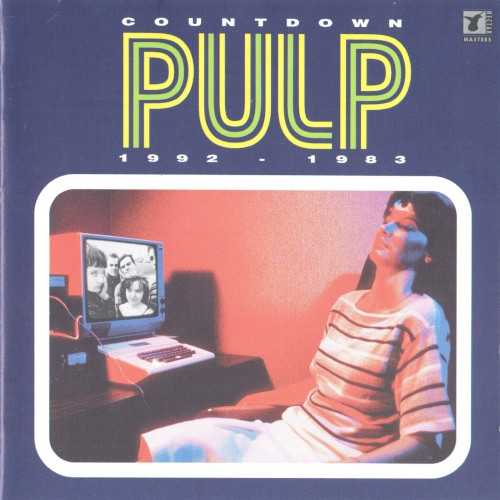 | Album: 9 of 18 Title: Countdown 1992–1983 Released: 1996-03-22 Tracks: 20 Duration: 1:36:50 Scroll: Up Down Top Bottom 25% 50% 75% Spotify Allmusic Wikipedia AlbumCover | 1 Countdown (radio edit) (04:41) 2 Death Goes to the Disco (05:43) 3 My Legendary Girlfriend (06:49) 4 Don’t You Want Me Anymore? (03:52) 5 She’s Dead (05:09) 6 Down by the River (03:39) 7 I Want You (04:42) 8 Being Followed Home (06:03) 9 Master of the Universe (03:22) 10 Don’t You Know (04:09) 11 They Suffocate at Night (06:18) 1 Dogs Are Everywhere (04:53) 2 The Mark of the Devil (04:34) 3 97 Lovers (04:28) 4 Little Girl (With Blue Eyes) (03:27) 5 Blue Glow (03:04) 6 My Lighthouse (album version) (03:30) 7 Wishful Thinking (04:16) 8 Blue Girls (05:58) 9 Countdown (extended version) (08:04) |
| Countdown 1992–1983 : Allmusic album Review : A double-disc collection released to cash in on Pulps massive success with Different Class, Countdown might be a rip-off compilation, but it does offer an effective introduction to Pulps 80s catalog. Since their recordings on Fire were decidedly uneven, Countdown does distill all the highlights a casual fan could want to hear. Beginning with the latest track, the 1990 single "Countdown," and working its way backwards, the compilations sequencing eases newer fans into both the bands more experimental and folkier work. Even though all of Pulps best material from this era is included, they lacked the pop sense that they developed in the early 90s, which could make this rough sailing for some recent fans. For those that want to dig deeper, there is plenty of fascinating material here. | ||
 | Album: 10 of 18 Title: This Is Hardcore Released: 1998-03-18 Tracks: 26 Duration: 2:10:40 Scroll: Up Down Top Bottom 25% 50% 75% Spotify Wikipedia Allmusic AlbumCover | 1 The Fear (05:35) 2 Dishes (03:30) 3 Party Hard (04:00) 4 Help the Aged (04:28) 5 This Is Hardcore (06:25) 6 TV Movie (03:25) 7 A Little Soul (03:19) 8 I’m a Man (04:59) 9 Seductive Barry (08:31) 10 Sylvia (05:44) 11 Glory Days (04:55) 12 The Day After the Revolution (14:57) 1 Cocaine Socialism (‘proper’ version) (05:13) 2 It’s a Dirty World (05:13) 3 Like a Friend (04:33) 4 The Professional (05:09) 5 Ladies’ Man (04:44) 6 Laughing Boy (03:49) 7 We Are the Boyz (03:13) 8 Tomorrow Never Dies (rough mix) (04:53) 9 Can I Have My Balls Back, Please? (04:16) 10 Modern Marriage (04:53) 11 My Erection (04:22) 12 You Are the One (04:27) 13 Street Operator (03:52) 14 This Is Hardcore (End of the Line remix) (02:05) |
| This Is Hardcore : Allmusic album Review : "This is the sound of someone losing the plot/youre gonna like it, but not a lot." So says Jarvis Cocker on "The Fear," the opening track on This Is Hardcore, the ambitious follow-up to Pulps breakthrough Different Class, thereby providing his own review for the album. Cocker doesnt quite lose the plot on This Is Hardcore, but the ominous, claustrophobic "The Fear" makes it clear that this is a different band, one that no longer has anthems like "Common People" in mind. The shift in direction shouldnt come as a surprise -- Pulp was always an arty band -- but even the catchiest numbers are shrouded in darkness. This Is Hardcore is haunted by disappointments and fear -- by the realization that what you dreamed of may not be what you really wanted. Nowhere is this better heard than on "This Is Hardcore," where drum loops, lounge piano, cinematic strings, and a sharp lyric create a frightening monument to weary decadence. Its the centerpiece of the album, and the best moments follow its tone. Some, like "The Fear," "Seductive Barry," and "Help the Aged," wear their fear on their sleeves, some cloak it in Bowie-esque dance grooves ("Party Hard") or in hushed, resigned tones ("Dishes"). A few others, such as the scathing "Im a Man" or "A Little Soul," have a similar vibe without being explicitly dark. Instead of delivering an entirely bleak album, Pulp raise the curtain somewhat on the last three songs, but the attempts at redemption -- "Sylvia," "Glory Days," "The Day After the Revolution" -- dont feel as natural as everything that precedes them. Its enough to keep the album from being a masterpiece, but its hardly enough to prevent it from being an artistic triumph. | ||
 | Album: 11 of 18 Title: Freshly Squeezed: …the Early Years Released: 1998-05 Tracks: 11 Duration: 48:36 Scroll: Up Down Top Bottom 25% 50% 75% Allmusic Wikipedia AlbumCover | 1 My Lighthouse (album version) (03:30) 2 My Legendary Girlfriend (06:49) 3 Don’t You Want Me Anymore? (03:52) 4 She’s Dead (05:09) 5 Little Girl (With Blue Eyes) (03:27) 6 Down by the River (03:39) 7 Blue Glow (03:04) 8 I Want You (04:42) 9 They Suffocate at Night (06:18) 10 Master of the Universe (03:22) 11 Countdown (radio edit) (04:41) |
| Freshly Squeezed: …the Early Years : Allmusic album Review : Considering how little attention was lavished upon Pulp by either the public or their record companies in the years before the groups mid-90s breakthrough, their earlier recordings have seen an awful lot of activity since then -- there are, at a rough count, more compilations drawn from the groups first three albums than there are songs on those same records, and Freshly Squeezed is just one more in an increasingly unlikable stream. No complaints about the music, of course -- up to and including This Is Hardcore, Pulp never put a musical foot wrong, with their earliest recordings dangling even more precipitously over the edge of some grand mental breakdown than most bands would even dare tread. And the 11 songs here certainly rate high within that canon; most, indeed, would effortlessly enter any all-time Pulp best-of selection. But still theres a sense of repetition to finding them on display once again, which means if youve managed to resist buying any of the past collections, this is definitely worth picking up. But dont worry if you cant find this exact album. Therell doubtless be another one along shortly. | ||
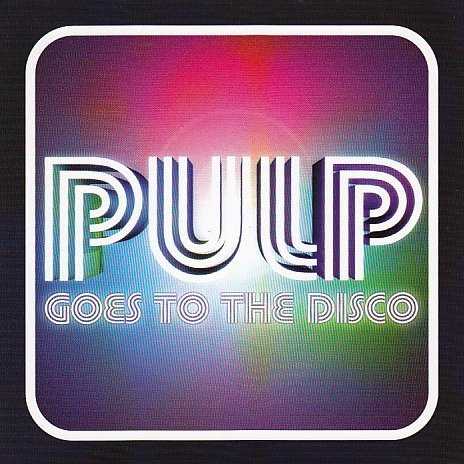 | Album: 12 of 18 Title: Goes to the Disco Released: 1998-07-13 Tracks: 10 Duration: 1:00:08 Scroll: Up Down Top Bottom 25% 50% 75% Allmusic AlbumCover | 1 Death II (05:36) 2 Death Goes to the Disco (05:43) 3 Countdown (radio edit) (04:41) 4 My Legendary Girlfriend (06:49) 5 Is This House? (07:59) 6 This House Is Condemned (remix) (07:31) 7 Countdown (extended version) (08:04) 8 Love Is Blind (05:45) 9 The Mark of the Devil (04:34) 10 Master of the Universe (03:22) |
 | Album: 13 of 18 Title: Primal: The Best of the Fire Years 1983–1992 Released: 1998-10-12 Tracks: 12 Duration: 1:03:24 Scroll: Up Down Top Bottom 25% 50% 75% AlbumCover | 1 My Legendary Girlfriend (06:49) 2 Countdown (extended version) (08:04) 3 Death Goes to the Disco (05:43) 4 Little Girl (With Blue Eyes) (03:27) 5 I Want You (04:42) 6 They Suffocate at Night (06:18) 7 Dogs Are Everywhere (04:53) 8 Don’t You Know (04:09) 9 She’s Dead (05:09) 10 Aborigine (04:53) 11 Separations (04:45) 12 97 Lovers (04:28) |
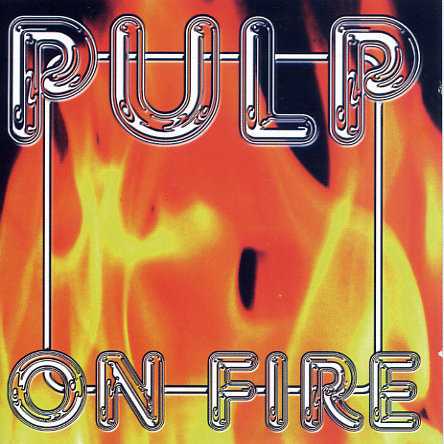 | Album: 14 of 18 Title: On Fire Released: 1999-11-29 Tracks: 21 Duration: 1:30:35 Scroll: Up Down Top Bottom 25% 50% 75% Spotify Allmusic AlbumCover | 1 My Lighthouse (album version) (03:30) 2 Wishful Thinking (04:16) 3 Joking Aside (04:20) 4 Boats and Trains (01:34) 5 Blue Girls (05:58) 6 Love Love (03:09) 7 In Many Ways (02:46) 8 Looking for Life (05:27) 9 Little Girl (With Blue Eyes) (03:27) 10 Simultaneous (04:09) 11 Blue Glow (03:04) 1 The Will to Power (03:25) 2 Dogs Are Everywhere (04:53) 3 The Mark of the Devil (04:34) 4 97 Lovers (04:28) 5 Aborigine (04:53) 6 Goodnight (05:08) 7 They Suffocate at Night (06:18) 8 Tunnel (08:13) 9 Master of the Universe (03:22) 10 Manon (03:33) |
 | Album: 15 of 18 Title: We Love Life Released: 2001-10 Tracks: 13 Duration: 1:02:12 Scroll: Up Down Top Bottom 25% 50% 75% Spotify TrackSamples Allmusic Wikipedia AlbumCover | 1 Weeds (03:41) 2 Weeds II (The Origin of the Species) (04:00) 3 The Night That Minnie Timperley Died (04:41) 4 The Trees (04:50) 5 Wickerman (08:19) 6 I Love Life (05:32) 7 The Birds in Your Garden (04:12) 8 Bob Lind (The Only Way Is Down) (04:15) 9 Bad Cover Version (04:16) 10 Roadkill (04:15) 11 Sunrise (05:52) 12 Yesterday (03:51) 13 Forever in My Dreams (04:23) |
| We Love Life : Allmusic album Review : It was clear that This Is Hardcore was a difficult, turbulent experience for Pulp -- it was such a troubled-sounding record that it was hard to tell where they would go next. Apparently that was as true for the band as it was for the listeners, since Pulp spent over three years preparing an album, cutting nearly a full record with longtime producer Chris Thomas before scrapping it all and entering the studio with cult hero (and Jarvis Cocker inspiration) Scott Walker. The pairing was intriguing but problematic, since Walker is not known as a producer and his recent recordings, such as Tilt and Pola X, were as inscrutable as Cocker was lucidly literate. Miraculously, the pairing resulted in the vibrant, reaffirming reinvention of We Love Life, an album that hints at music from Pulps distant past (its much closer to It than anything theyve done since, though it has elements of the epics scattered through His n Hers) while finding a new voice for the band and Jarvis as a lyricist. Its easy to see that this is a mature album, but that suggests a studied self-consciousness and safe, coffee-table artiness. This is maturation in a different sense -- Cocker has lived through dark times, as was evident in This Is Hardcore, and still sees difficulty in the present and past (the haunting centerpiece of "Wickerman"), but here he embraces life, even seeing his place in the grand scheme of things. Previously, Pulps sleek music had been as darkly romantic as a drunken late night in a metropolis, and Cockers lyrics were wittily urbane, embracing and mocking the idiosyncrasies of contemporary life, but here the music is considerably more organic -- Candida Doyles synth, a former signature, can barely be heard -- and Cockers elaborately detailed lyrics are trim and focused, filled with nature imagery. This is hardly a pastoral album, though, even with the occasional string section and acoustic guitars, nor does this sound like Pulps version of a Scott Walker album. Instead, this is an emotional and musical breakthrough, finding the band leaping beyond the claustrophobic Hardcore and consolidating their previous obsessions, creating a textured, reflective record that in its own measured way is as impassioned as Different Class -- its just that Jarvis is railing against the impulses within himself, and he winds up finding a way out. As such, We Love Life is warm and embracing, even when it delves into darkness, never nearly as despairing as Hardcore, and nearly as affirming as Different Class. And if that record was the mis-shaped misfit finally letting the world know that he was special, this is that same misfit turning inward, realizing that the world itself is special. Not the kind of thing that results in a massive hit, but its tremendously rewarding all the same. | ||
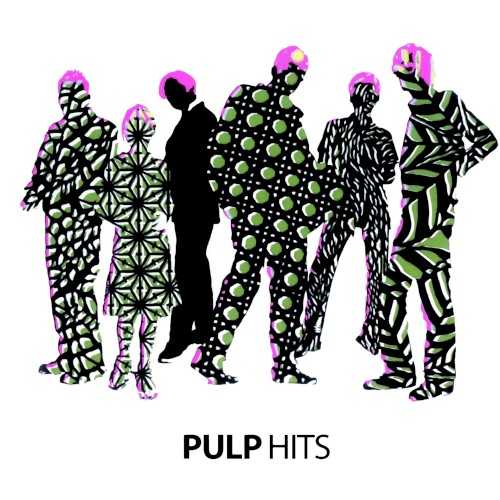 | Album: 16 of 18 Title: Hits Released: 2002-11-18 Tracks: 16 Duration: 1:12:17 Scroll: Up Down Top Bottom 25% 50% 75% Spotify Allmusic Wikipedia AlbumCover | 1 Babies (04:04) 2 Razzmatazz (03:40) 3 Lipgloss (03:35) 4 Do You Remember the First Time? (04:22) 5 Common People (05:51) 6 Sorted for E’s & Wizz (03:42) 7 Disco 2000 (04:33) 8 Something Changed (03:18) 9 Help the Aged (04:28) 10 This Is Hardcore (06:25) 11 A Little Soul (03:19) 12 Party Hard (04:00) 13 The Trees (04:50) 14 Bad Cover Version (04:16) 15 Sunrise (05:52) 16 Last Day of the Miners’ Strike (05:55) |
| Hits : Allmusic album Review : More than any other band of the 90s, Pulp were quintessentially British -- not the same thing as being quintessentially Britpop, mind you, which is an entirely different thing. Though it was frequently fey, at least when Blur were concerned, Britpop was for the lager-loving lads, a patriotic celebration of the country, particularly its pop culture heritage. Pulp shared many of those same roots as their peers, plus they were pop obsessives, capturing the intuitive, subliminal things that separated the dedicated from the poseurs. They were the misshapes, misfits -- the art-loving geeks grown beautiful who had a brief moment in the sun before they returned to the outskirts of pop life. To some observers, that might have looked like they were dropping the ball, but turning to the murky darkness of This Is Hardcore after the shining Different Class was artier and more natural than Blurs similar turn with 13, and they made better singles when they returned to arty darkness, too, as Hits, a glorious recap of their stint at Island in the 90s, illustrates. Pulp, of course, had been around long before they moved to Island, but it wasnt until the early 90s that they truly came into their own, starting with Pulpintro EP and the sublime "Babies" single. From there, they produced four terrific albums, including one stone masterpiece (1995s Different Class which, years later, stands alongside Parklife as the greatest testament of Britpop), the near-perfect His n Hers, the fascinating decadence of This Is Hardcore, and the gorgeous Scott Walker-produced We Love Life. Each album has a different character, a different feel, but throughout it all, Pulp turned out tremendous singles that functioned within the context of the album and as their own entity because they were vividly imagined and sharply written, which may be why they hold together so well as their own album. Apart from the image-defining "Mis-Shapes," theres nothing missing from Hits, and while these are songs identified with their time, they transcend it, with even the new contribution, "Last Day of the Miners Strike," holding its own on a collection of singles as strong as anything in 90s pop music. | ||
 | Album: 17 of 18 Title: The Peel Sessions Released: 2006-10-23 Tracks: 29 Duration: 2:16:26 Scroll: Up Down Top Bottom 25% 50% 75% Spotify Allmusic Wikipedia AlbumCover | 1 Turkey Mambo Momma (02:53) 2 Please Don’t Worry (03:21) 3 Wishful Thinking (04:18) 4 Refuse to Be Blind (04:28) 5 Pink Glove (05:09) 6 You’re a Nightmare (05:19) 7 Acrylic Afternoons (03:46) 8 Underwear (04:07) 9 Common People (05:40) 10 Pencil Skirt (03:17) 11 Sunrise (05:58) 12 Weeds (03:46) 13 I Love Life (05:10) 14 Duck Diving (06:34) 1 Peter Gunn Theme (04:06) 2 Sorted for Es & Wizz (04:11) 3 Help the Aged (04:11) 4 This Is Hardcore (07:05) 5 Sunrise (05:59) 6 Mile End (04:24) 7 Do You Remember the First Time? (04:00) 8 Babies (04:10) 9 Weeds (03:44) 10 Weeds II (The Origin of the Species) (03:52) 11 The Fear (05:23) 12 The Trees (04:42) 13 I Love Life (04:41) 14 Party Hard (04:27) 15 Common People (07:34) |
| The Peel Sessions : Allmusic album Review : As Jarvis Cocker points out in his liner notes for the 2006 double-disc set The Peel Sessions, Pulp allegedly holds "the world record for The Longest Gap Between First & Second Sessions (12 years!)" -- a situation that says more about Pulp than it does about John Peel, since there is a reason why the legendary British DJ didnt quickly invite the Sheffield group back to his studios: it took them a long time to realize the potential they demonstrated at the outset of this career. This set cuts out that long decade of struggle -- since there are no Peel sessions documenting the stilted steps forward during the 80s, those awkward transitions are nowhere to be found, which makes the leap forward from 1981 to 1993 all the more startling. The tentative yet exuberant art-punk on their first session has plenty of promise -- its gangly rhythms, jittery guitars, swaths of synths, and echoed vocals all recalling Factory Records tightly wound sound without belonging to it, largely due to Jarvis himself, whose schoolboy poetry has a beguiling innocence and whose love of pop already is peeking out behind his artiness. That artiness may overwhelm "Refuse to Be Blind," which only points the way toward the murk of Pulps mid-80s work, but the other three cuts from 1981 -- the insistent, surging "Turkey Mambo Momma," the cheerfully dorky "Please Dont Worry," and the understated melancholia of "Wishful Thinking" -- all show a good art-pop at their beginnings, fumbling forward but performing with a kinetic enthusiasm that makes this session better than Pulps debut proper, It. Once "Refuse to Be Blind" wraps up, The Peel Sessions jumps forward 12 years to the summer of 1993, just as Pulp was leaving the indie Gift behind for the major Island -- just as the band was beginning to blossom, actually. Jarvis had devised his outsider persona, raising his obsessions with sex and otherness to near-mythic levels, and the band had developed a sound to match: a blend of 70s glam and pop tempered by the artiness of 80s indie post-punk, both in its mood and its emphasis on Cockers lyrics, which recalled Morrisseys dominance in the Smiths without ever sounding like Moz. The 1993 session consisted of two of the moodier numbers that would later appear on 1994s His n Hers -- "Pink Glove" and "Acrylic Afternoons" -- plus "Youre a Nightmare," unreleased to now but of a piece with its companions, only not as immediate or hooky. Immediacy and hooks were what distinguished the other parts of His n Hers written after this session and they drove Pulps 1995 masterpiece Different Class, and three cuts from that seminal effort were played for Peel in 1994: "Underwear," "Common People," and "Pencil Skirt," all sounding glorious here, if not quite as robust as they would just a year later, when a road-tested Pulp, buoyed by the Brit-pop phenomenon of the mid-90s, conquered Glastonbury and hit number one with "Common People," thereby sending the band to superstardom. Here, the band does not play with the authority of stars; theyre still hungry and nervy, which makes this an interesting contrast to the assured live performances theyd deliver not long afterward (to hear exactly how, compare the "Common People" here to the Glastonbury performance on the Different Class deluxe edition released at the same time). Even their next Peel session -- which does not arrive immediately after the 1994 session for some reason; rather its sandwiched between two latter-day performances on the second disc -- doesnt showcase Pulp as superstars: it was recorded just prior to the release of Different Class and contains none of the songs from the album, just the Trainspotting anthem "Mile End" and two singles from His n Hers, "Do You Remember the First Time?" and "Babies." The confidence is there, but not necessarily assurance: theyre conquering, they havent conquered yet. Nevertheless, the performances are absolutely cracking, particularly a bracing "Babies." The rest of the set doesnt chronicle either the conquering Pulp of 1995/1996 or the dark introspection of 1998s This Is Hardcore: it contains three sessions from 2001, all from the last days of the band, just as they were releasing their final album, We Love Life. The first of these was performed a couple months before the albums release, featuring three of the albums songs plus the otherwise unavailable "Duck Diving"; the second derives from a performance aired in conjunction with the BBCs 40 Years in Broadcasting Celebrations, finding Pulp covering "Theme from Peter Gunn," reviving "Sorted for Es and Wizz," then doing two Hardcore songs before finishing out with "Sunrise"; the final is taken from a performance at the Birmingham Academy not long after the albums release, where four songs from We Love Life are balanced by "The Fear," "Party Hard," and "Common People." All three sessions stand in direct contrast to the unwieldy band first heard in the 1981 session: this is an assured group of veterans whose new music is nuanced and complex and performed with skill that makes it seem easy, yet also able to perform the old favorites with spirit -- not so that they sound fresh, necessarily, but they still sound vital. Its as if that long wait to return to Peels studios made Pulp determined to make each of their (what turned out to be many) sessions count, even when they were stars, even when they were quietly winding down their career, and thats what makes this a necessary addendum to their career. | ||
 | Album: 18 of 18 Title: Party Clowns: Live in London 1991 Released: 2012-11-12 Tracks: 8 Duration: 40:12 Scroll: Up Down Top Bottom 25% 50% 75% Spotify Allmusic AlbumCover | 1 Space (03:35) 2 Death II (05:51) 3 Live On (04:14) 4 Love Is Blind (05:06) 5 Separations (04:21) 6 Babies (04:10) 7 My Legendary Girlfriend (07:39) 8 Countdown (05:16) |
| Party Clowns: Live in London 1991 : Allmusic album Review : Recorded in 1991, just a few years before Pulp became household names, the concert captured on Party Clowns was originally broadcast on the BBC as part of a series dubbed Class of 91. Pulp werent destined to be part of the class of 91 -- "Babies," the new song debuted here, didnt capture the publics imagination until 1994 -- but this concert shows Pulp on the cusp of developing the slick, slippery, sly sound thatd make them stars. Jarvis Cocker sounds comfortable on stage, announcing songs with ease, his patter as intoxicating as the performances, and the elastic songs -- "Legendary Girlfriend," "Countdown," "Space," "Separations" -- give him and Pulp plenty of room to stretch. Theyd get tighter and better a few years down the road, but Party Clowns captures a sharp, smart band figuring out its strengths, and its pretty exciting in that regard. | ||